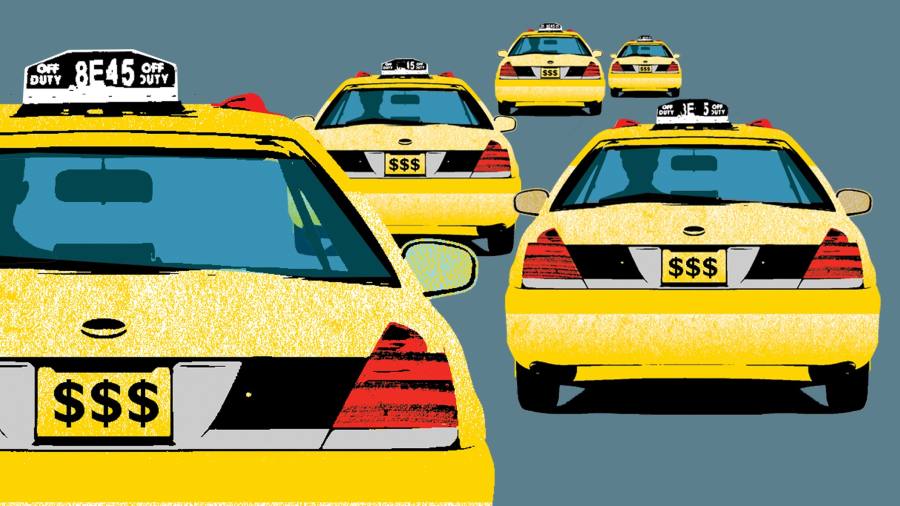[ad_1]
Last week, as a combination of sunny weather and improving Covid-19 news warmed the spirits of many New Yorkers, I went walking in a park near the residence of mayor Bill de Blasio.
There I saw something to puncture the spring optimism: dozens of taxi drivers had parked their iconic cabs, the same colour as the daffodils, on the street by Gracie Mansion and were noisily protesting nearby.
The drivers were asking de Blasio to use the funds that New York is receiving from America’s $1.9tn stimulus package to support debt relief for them. According to New York state senator Jessica Ramos, the drivers have an average of $500,000 debt as a result of borrowing heavily to buy a medallion, the taxi-driving permit that the city issues.
The drivers want lenders to reduce loan burdens to $125,000 and then want de Blasio to “backstop†those debts, but the city has a different idea: last week de Blasio unveiled a $65m package for drivers which offered a $20,000 interest-free loan to help them pay off some of their debts.
The New York Taxi Workers Alliance, which represents 21,000 drivers, says the plan bails out the hedge funds that made the loans to drivers, rather than the drivers themselves. The union has called the medallion-debt situation an “economic crisis on the verge of becoming a humanitarian crisisâ€.
Is this simply a New York fight? Some readers might be tempted to think so. After all, those bright yellow cabs are a symbol of the city, and its taxi services have long been run in an idiosyncratic manner, using rules first devised in the 1930s.
Yet what makes this local tussle so interesting is that the core issue extends well beyond the Big Apple, touching on policy questions that now confront many western governments. As Covid-19 shut down large parts of the economy worldwide, many places have (rightly) provided aid to support vulnerable people and ailing industries.
But now that a recovery is in sight, the challenge is determining who still deserves assistance. Should debt be written off if it was incurred pre-Covid but worsened by the pandemic? Should governments prop up industries that cannot thrive in a digitised, post-pandemic world? How much creative destruction should take place if it causes more human pain?
There are no easy answers, as the yellow cab saga shows. A few decades ago, driving a taxi in New York seemed like a reliable way to get a foothold on the American dream. The overwhelming majority of drivers are immigrants, and many were so convinced that the job was secure that they took out large loans for their medallions.
Since the city carefully controls the supply of medallions, their price used to be steady in secondary markets, trading at around $250,000 between 1995 and 2002. However, after the financial crisis of 2008, lenders that were looking for new business niches started to offer medallion credit to drivers, sparking price inflation, as I examined at the time.
Medallion prices rose to more than $1m in 2014. But since ride-hailing apps such as Uber entered the market, they have plunged back to around $200,000 today. While yellow cab drivers have seen their income collapse, their medallion-linked debt has not declined. Worse still, this debt was often extended on predatory terms, echoing the subprime mortgage scandals. The result has been a profound tragedy for many drivers, even before Covid-19, leading to some suicides.
Hence the industry’s demands for debt relief, which are backed by Letitia James, New York state attorney-general, who launched an investigation into allegedly predatory medallion lending practices in 2019 and even threatened to sue the city to provide debt relief (though ultimately did not).
On a human level, it is hard to avoid feeling sad about these tragedies – or to disagree that the taxi drivers deserve support, not least because some of them seem to have been ill-equipped to realise the predatory nature of the loans that were pushed on them. But the problem that confronts de Blasio is that New York has a serious budgetary crisis of its own, which is likely to get worse this year since some wealthy taxpayers have fled to places such as Florida. Many New Yorkers consider it unfair to bail out one hard-working impoverished group without helping others.
Then, of course, there are the bigger questions that any free-market economist might ask: does it make sense to rescue the yellow cab industry in a world where digital disruption is likely to only intensify? Is this medallion system (which is also used in places such as Boston and Chicago) even fit for the 21st century? Is it time to overhaul the entire taxi and ride-sharing system, to provide more protection to drivers of every sort?
My answer to the last question is a definite “yesâ€. It would be nice to think the pandemic disruption and fight about taxi debt in New York could spark a bigger overhaul. But this will take a long time, so in the short term there will undoubtedly be more emotive negotiations between de Blasio and the taxi union. Economic stress will not simply melt away, even if there is a warm summer economic recovery, nor will the fights about what is “fair†policy in a post-pandemic world.
Follow Gillian on Twitter @gilliantett and email her at gillian.tett@ft.com
Follow @FTMag on Twitter to find out about our latest stories first.
[ad_2]
Source link





